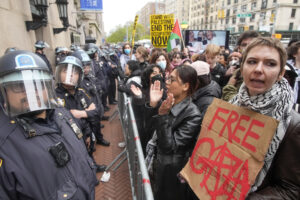Columbia Sociologist on Past Social Movements and More
Sociologist Todd Gitlin, former president of Students for a Democratic Society and a Columbia University professor, compares OWS to other American uprisings, discusses the media's early coverage of the protests and considers the fate of the movement's signature leaderless form. (more)
Sociologist Todd Gitlin, former president of Students for a Democratic Society and a Columbia University professor, compares OWS to other American uprisings, discusses the media’s early coverage of the protests and considers the fate of the movement’s signature leaderless form with writer and Harvard University student Matt Bieber.
Unlike the movements for civil and gay rights and against the Vietnam War, Gitlin says, Occupy Wall Street instantly captures the dissatisfaction of huge numbers of Americans suffering from deepening economic inequality. For this reason it has the potential to become a genuine majoritarian force in relatively short time.
The media’s response to confrontations with police has helped push the movement forward, he continues. Significant spikes in news coverage occurred after police officers hit protesters with pepper spray, arrested hundreds on the Brooklyn Bridge and engaged demonstrators in other clashes. And sustained alliances with unions, political advocacy groups and lobbies may provide the broad organizational muscle protesters need to make inroads into American politics. –Alexander Reed Kelly
Your support matters…The Wheat and Chaff:
MATT [BIEBER]: During a panel last week at Harvard’s Kennedy School, you suggested that there’s a key difference between the Occupy Movement and other social movements. While most social movements begin with sparse public support, the Occupy Movement begins with potentially widespread support for its goal of reducing wealth inequality. Say more about this distinction and what it might mean for the Occupy Movement.
TODD: I hadn’t realized this until I checked off the movements of my recollection, that they had started as minority uprisings – at least expressions of dissidence – in comparison to the population as a whole. So the Civil Rights Movement, which obviously was popular with black people but not with Americans overall, certainly not in the South, when it broke out. The anti-Vietnam War movement represented a small minority, maybe a little more than 10%, when it erupted. The women’s movement, it’s hard to say – possible exception there. The gay movement was certainly not a popular movement over all. I see this more as the rule than the exception. Perhaps the major exceptions in American history were the Populist and labor movements against the robber barons in the late 19th century. But of course there were no polls, so nobody knows.
… In the Occupy movement, the frustration is palpable, but we have this immense oddity in the political system, which is that disgust at plutocratic rule is widespread and yet the political system blocks it from momentum, from achievement, from full-blooded political expression.
Independent journalism is under threat and overshadowed by heavily funded mainstream media.
You can help level the playing field. Become a member.
Your tax-deductible contribution keeps us digging beneath the headlines to give you thought-provoking, investigative reporting and analysis that unearths what's really happening- without compromise.
Give today to support our courageous, independent journalists.





You need to be a supporter to comment.
There are currently no responses to this article.
Be the first to respond.